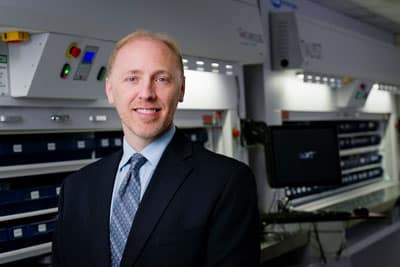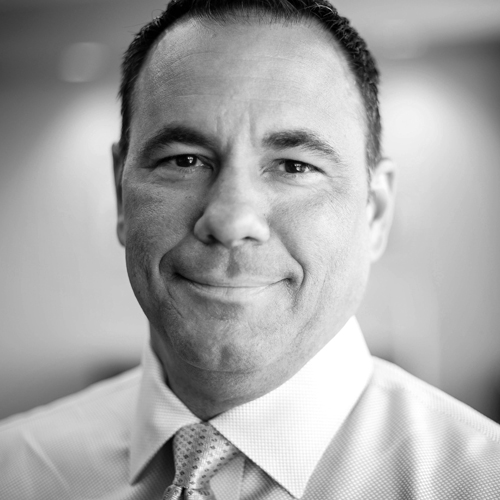Gary Johnson stepped into his position at chief pharmacy officer with a mandate to focus on inpatient care at University of Kentucky HealthCare (UKH). But he also brought a vision for developing a much broader approach to how ambulatory pharmacy services could make significant contributions to the well-being of the 900-bed hospital’s finances and patients. An agreement was reached that as long as he met the inpatient objectives, he was free to develop an ambulatory pharmacy model. Since then, ambulatory pharmacy services have become the single largest contributor to UKH’s bottom line.
How large of an increase have you made in UKH’s pharmacy services in the last five years?
Gary Johnson: When I arrived, there were only two retail pharmacies. Now, we have six retail pharmacies providing prescriptions for many patient types, including discharge, same-day surgery, emergency department, clinic, contract pharmacy, specialty, and employee prescriptions. These combined activities have resulted in an annual ambulatory pharmacy net income growing from $12 million to $86 million.

Was there internal resistance to your plans?
Johnson: Health systems typically don’t think of prescriptions as a source of value, but they are why big retail chains put stores around hospitals. UKH actually wanted to close one of its two original retail pharmacies to eliminate the operational costs. We had to educate stakeholders on the benefits of an aggressive ambulatory pharmacy program, which included expanding the federal 340B program that facilitates large medication discounts for hospitals with indigent patient populations that exceed 11.5 percent—as well as our work with program vendor partners Verity and ScriptPro. Our rate for Medicaid and uninsured patients is around 30 percent, so that presented tremendous possibilities. We had to help senior leadership understand the opportunities this kind of program could provide.
“Health systems typically don’t think of prescriptions as a source of value, but they are why big retail chains put stores around hospitals.”
Aside from the financial advantages, describe some of the other benefits you’ve been able to provide.
Johnson: Rather than lose prescription processing to commercial chains, we’ve tried to drape an iron curtain around the entire health system. That allows us to integrate the full continuum of care. We share information with physicians about whether patients are complying with their medication regimens. We have merged inpatient and ambulatory care so that when a patient is admitted we reconcile their current medications with what they need while inpatient. Then, when they’re discharged, we explain the new prescriptions, how to take them, which of the old ones to discontinue, and offer to fill the new ones. We even deliver their discharge prescriptions directly to their rooms through a concierge service we call Meds-to-Beds that is in conjunction with ScriptPro. When it first started, we were providing discharge prescriptions for about 15 percent of patients. Now it’s up to 60 percent, and we’ve seen a corresponding 15 percent decrease in the number of patients coming back through the emergency department. We’re also able to provide specialty medications within twenty-four hours instead of patients having to wait up to two weeks to get them through the mail.
Can you explain more about the specialty pharmacy services?
Johnson: New biologic drugs are being derived from human plasma and other organic proteins that are highly effective at curing, not just treating, conditions like hepatitis C. Within three months, these new drugs can remove the hepatitis C virus from the body, but it’s very expensive—up to $100,000. We work with our laboratory genomics department to determine the patient profile and the appropriate duration of treatment. To comply with manufacturers’ protocols and insurers’ requirements for dispensing, we also established a call center that contacts patients to monitor compliance and is available to answer their questions around the clock. All of these services and capabilities have also been developed with ScriptPro and have succeeded in creating a specialty pharmacy program that contributes 40 percent of UKH’s monthly income from operations—and that’s from a total of 2,000 prescriptions compared to 35,000 that make up the remaining 60 percent.
As you’ve expanded pharmacy services so extensively, how have you also managed to improve efficiency?
Johnson: We introduced a lot of automation. We use five high-density storage carousels provided by Talyst that hold $5 million worth of medications. Each
carousel responds to prescriptions that originate from patients’ EMRs and delivers them to the pharmacist. They’ve reduced medication errors by 76 percent. We’ve integrated the software controlling carousel delivery with the hospital’s electronic records so clinicians can all access real-time information regarding the status of medications being delivered to the floor. The inventory automation also tracks everything that we dispense on a daily basis and automatically suggests orders to maintain a five-day par level for every drug. That has helped reduce overall inventory by 35 percent.
In addition, we use a robotic arm to prepare IV medications. It’s sealed, so contamination is nonexistent and we can mass-produce drugs with long expiration dates, which isn’t possible when preparation is done manually. With lots of drug shortages, we can compound drugs—such as nicardipine—that manufacturers stop making and then often reintroduce with tremendous price increases.
What are your future plans at UKH?
Johnson: I want to continue expanding the ambulatory pharmacy infrastructure, so we can service an even broader array of patients.

